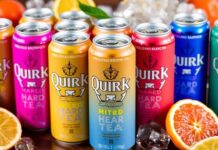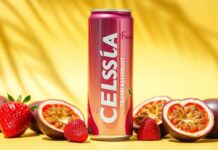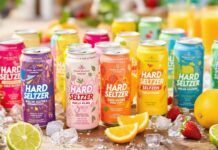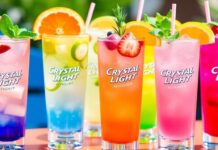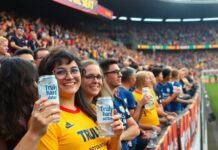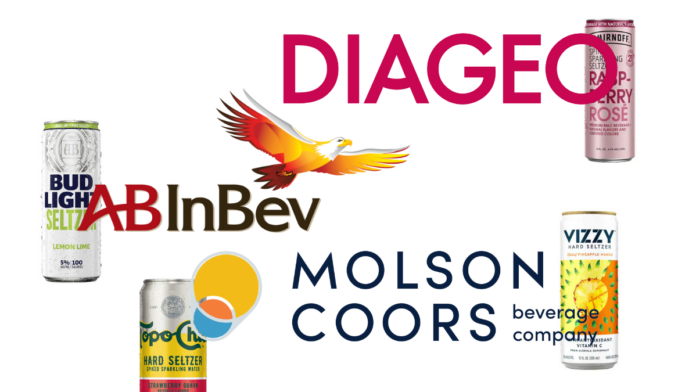We look at the competitive environment for hard seltzer manufacturers.
This is a big week for the competitive public companies producing hard seltzer. Three of the most prominent names in the beverage alcohol industry will announce their quarterly earnings. Anheuser-Busch (NYSE: BUD), Molson Coors (NYSE: TAP) and Diageo (NYSE: DEO), all of whom have a significant stake in hard seltzer, will be reporting their quarterly earnings on Thursday. Investors and competitors alike will be focused on the performances of these industry leaders and their seltzer brands in the hope of gaining insight into the future of the bubbly beverage.
Earnings announcements from the three beverage titans will come exactly one week after shares of another powerhouse, The Boston Beer Company (NYSE: SAM), plunged 20% in the wake of its own earnings summary
. The maker of Truly Hard Seltzer fell short of analysts’ Q2 expectations, missing both its top and bottom line and prompting the company’s CEO, Dave Burwick, to comment on the competitive environment: “We overestimated the growth of the hard seltzer category.”
Boston Beer’s Truly is the #2 hard seltzer on the market behind Mark Anthony Brands’ White Claw. After the brewery’s underwhelming earnings report last Thursday, the mainstream media has been quick to question whether hard seltzer’s run on the market is nearing its end. One major factor this narrative overlooks is how diverse and oversaturated the seltzer market has become in recent years. It is likely companies such as Boston Beer will continue to be forced to manage their expectations as the category adjusts to make room for healthy competition.
Truly launched alongside White Claw in 2016. The brands quickly became industry leaders and have since consistently controlled around 75% of the market. In 2018, two full years after Truly and White Claw first launched, there were still only 10 hard seltzer brands in existence. By last year there were almost 70 hard seltzer brands on the market and now it seems like every beverage company, brewery and celebrity is crafting their own version of the boozy sparkling beverage.
Brands such as E&J Gallo’s High Noon Vodka & Soda Seltzer and AB InBev’s Bud Light Seltzer launched in the past two years and immediately proved ready to compete. According to a report published by Backbar last month, High Noon enjoyed “the largest gain of share points year-over-year, growing by 6.3 points in the first six months of 2021,” controlling 10.4% of the seltzer market share on the platform. High Noon’s market gain was, likely, a contributing factor in White Claw’s 15.4 share point dip over 2021’s first two quarters.
White Claw remained #1 according to the bar inventory platform but High Noon’s impressive performance and the emergence of Bud Light Seltzer, which accounted for another 10% of the category’s market share, certainly cut into the Mark Anthony Brand seltzer’s lead.
Hard Seltzer Proliferation
The hard seltzer market has evolved dramatically over the past 5 years. It is not surprising that the abundance of seltzer choices on retail shelves coupled with the unprecedented effects of quarantine related changes in consumer shopping habits have resulted in a redistribution of power amongst brands. The founder and chairman of Boston Beer, Jim Koch, recently stated that it is the saturation of “new hard seltzer brands at retail that [results] in a proliferation of choices and consumer confusion.”
Last year pandemic related regulations shuttered on-premise locations and resulted in an influx of consumers enjoying hard seltzers in their homes. Because consumers were no longer restricted to the one or two major brands often carried by venues, such as Truly and White Claw, they were able to purchase and try products they almost certainly would not have had access to at their favorite bars and restaurants before the lock-downs began. Post-pandemic bars are now hip to the profusion of brands on the market and are making new offerings available to their clientele.
Boston Beer’s Miscues
Contrary to popular opinion, Boston Beer did not overestimate the growth of the category. Instead, the company likely underestimated its competition. Boston Beer has invested heavily in Truly over the past year. The brewery has launched Truly Iced Tea Seltzer
, and a limited edition line of alcohol-infused lemonade freeze pops all within the last 12 months.
The company also recently teamed up with award-winning musician Dua Lipa for Truly’s No One Is Just One Flavor campaign, its biggest media investment to-date. Boston Beer ramped up Truly’s advertising budget and product lines but failed to account for the post-pandemic consumers’ newfound interest in exploring the many seltzer brands on the market and the readiness of on-premise venues and retail locations to acquiesce.
With Thursday’s earnings announcements on the horizon, Anheuser-Busch, Molson Coors and Diageo are in an interesting predicament. Will they also be reducing their profit expectations or will they benefit from Boston Beer and Truly’s missteps?
AB InBev
Anheuser-Busch is home to major seltzer brands such as Bud Light Seltzer, Michelob Ultra Organic Seltzer, Travis Scott’s Cacti and Bon V!V. The company also recently acquired the canned cocktail brand Cutwater Spirits. Earlier this spring Cutwater expanded its Major League Baseball co-branding. With the baseball season underway, it will be interesting to see if the partnership helps this quarter’s numbers. The alcohol beverage company also has a distribution agreement in place with Canteen.
Like Boston Beer, AB InBev has spent big on Super Bowl ad campaigns and marketing. The company also recently announced plans to invest $1 billion into its US manufacturing plants to keep up with consumer demands for hard seltzer. Unlike Boston Beer, AB InBev has many hard seltzer brands to its name, including several up-and-coming brands aiming to even the playing field by adding to Anheuser-Busch’s share of the seltzer market.
In its first quarter of this year, AB InBev boasted impressive 14.2% profit growth and top-line growth of 17.2%. The same day of its first quarter earnings announcement, the company also claimed that its “seltzer portfolio continues to grow ahead of the industry according to IRI.” If positive, Thursday’s Q2 results will help validate newer brands in the hard seltzer space.
Molson Coors
Molson Coors also has more than one hard seltzer to its name. The company recently discontinued Coors Hard Seltzer to focus on another of its brands, Vizzy, a hard seltzer enhanced with antioxidant vitamin C. In 2020 Vizzy made Neilsen’s top 10 growth brands list and has continued to be successful. Molson also distributes and produces Topo Chico Hard Seltzer for the Coca-Cola Company and is currently working on the creation of Topo Chico Ranch Water.
Much like Anheuser-Busch, Molson Coors has set its sights on a spot on the hard seltzer leaderboard by chipping away at White Claw and Truly’s numbers. Last year CEO Gavin Hattersley stated by “the end of 2021, we plan to capture a double-digit share of the U.S. seltzer market, backed by what arguably is the most complete seltzer portfolio in the business.” Earlier this year the company invested millions of dollars towards upgrading production facilities in Canada and the US with the goal of boosting seltzer output.
Last quarter Molson Coors overperformed, beating top and bottom line estimates and reporting $1.9 billion in revenue. The company also spoke highly of its hard seltzer portfolio’s performance in Canada and across Europe. Thursday’s announcement will shed light on the success of Molson’s seltzer strategy.
Diageo
Diageo’s strategy to hold its own in the RTD category seems to involve acquiring successful start-up companies to add to its growing repertoire of canned cocktails and seltzers. For companies that can afford to do so, acquiring existing brands is a quick way to increase market share and establish itself within a category. Diageo’s family of RTD products includes recently acquired brands such as Far West Spirits and Loyal 9 Cocktails.
The brand also owns Smirnoff. In May Smirnoff’s Zero Sugar Black Cherry Seltzer was named Best of Class in the Hard Seltzer category at the prestigious San Francisco World Spirits Competition and earned a coveted Double Gold medal. The brand earned 5 of the 24 medals awarded to hard seltzers in the category. Additionally, Diageo owns Crown Royal, Captain Morgan, Kettle One and Tanqueray, all of which have RTD cocktail brands on the market.
Like Anheuser-Busch and Molson Coors, Diageo announced plans to support its hard seltzer and RTD beverage production by investing $80 million towards expanding its Plainfield, IL facility. The upgraded facility will be capable of producing more than 25 million cases of canned beverages every year. On Thursday investors will find out just how successful Diageo’s strategy of casting its net wide has been.
By diversifying their hard seltzer and RTD product offerings, upgrading facilities and aiming for a piece of the seltzer pie, Anheuser-Busch, Molson Coors and Diageo hope to benefit from Boston Beer’s misfortune. Thursday will be a telling day for hard seltzers and the broader RTD category.
With so many seltzers available, the market is not losing its fizz, rather it is evolving and fostering a robust competition amongst brands–a win for both consumers and companies.
- Oregon Fruit Products Introduces Concentrates for the Fermentation Market - September 14, 2023
- Passion Tree Hard Seltzer Pledges Environmental Sustainability - August 30, 2023
- SYSTEM Seltzers Now Available Across The Country In Time for Dry January - January 9, 2023


